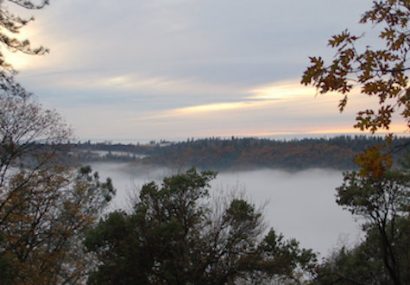On April 9, 2018, the Colorado Supreme Court upheld the Adams County District Court’s decision granting summary judgment against Front Range Resources, LLC (Front Range) thereby denying its application for new groundwater rights and an accompanying replacement plan. In affirming the decision, the Supreme Court held that the anti-speculation doctrine applies to replacement plans involving new appropriations or changes of water rights of designated ground water. [Front Range Resources, LLC v. Colorado Ground Water Commission, et al., 2018 CO 25, ___P.3d___ (Colo. Apr. 9, 2018).]
Case History
In 2008, Front Range applied for a replacement plan in the Lost Creek Designated Ground Water Basin. [“Designated ground water” means that ground water which in its natural course would not be available to and required for the fulfillment of decreed surface rights, or ground water in areas not adjacent to a continuously following natural stream wherein ground water withdrawals have constituted the principal water usage for at least 15 years preceding the date of the first hearing on the proposed designation of the basin, and which in both cases is within the geographic boundaries of a designated ground water basin. C.R.S. 37-90-103(6).] Front Range planned to construct 31 new, large-capacity wells and increase the use of several of its existing wells. To replace those new diversions, Front Range proposed to divert water from its existing rights in the South Platte River and use that water to recharge the Lost Creek Basin Alluvial Aquifer, thereby compensating for the new withdrawals.
Several different groups objected to the plan, including the Colorado Ground Water Commission (GWC) and Northern Colorado Water Conservancy District. In an initial hearing before the GWC, the hearing officer denied use of the South Platte rights in the replacement plan. During this time, Front Range also entered into an option contract with the City of Aurora allowing Aurora to purchase some or all of the newly pumped water under the replacement plan.
The application was then dismissed with prejudice, allowing it to be appealed to the state District Court. Once there, defendants filed a motion for partial summary judgment regarding whether the South Platte rights could in fact be used in the replacement plan. The District Court agreed with the hearing officer, ruling that the rights could not be used because replacement in the Lost Creek Basin was not a decreed use for those rights.
The defendants then filed another motion for summary judgment to dismiss the entire replacement plan on the grounds that it violated in the anti-speculation doctrine. That doctrine, codified in C.R.S. § 37-92-103(3) and solidified through decades of case law, holds that a water user, with a limited exception for governments, may not be granted a water right without a specific plan to put that water to beneficial use including an end user for the water. In essence, this encourages the beneficial use of water by preventing water rights from being tied up for years on plans that never come to fruition.
Front Range answered the motion for summary judgment with a two part argument: first, Front Range said that the anti-speculation doctrine did not apply because the replacement plan didn’t involve new appropriations – it was simply using the same amount of water, just by ground water pumping instead of surface diversion on the South Platte. In the alternative, Front Range claimed that, if the doctrine applied, it had shown specific plans to use the water through its option contract with Aurora and a planned unit development (the “Pioneer PUD”) on its land.
The District Court used language from Front Range’s own proposed decree to determine that the replacement plan involved both new appropriations and changes to water rights, and therefore the anti-speculation doctrine applied. But, the court then found that neither the Aurora option contract nor the Pioneer PUD contained any actual evidence or plan to put the water to beneficial use. As a result, the District Court granted defendant’s motion for summary judgment and the case was dismissed.
The Colorado Supreme Court’s Decision
The Supreme Court affirmed the District Court’s ruling, finding that the replacement plan did involve the anti-speculation doctrine, and that it failed to meet the burden of showing a specific plan to put the water to beneficial use.
Does the Plan Invoke the Anti-Speculation Doctrine?
The Court first reviewed Front Range’s argument that the plan did not trigger the anti-speculation doctrine because:
- . . .the plan would merely operate to divert water from Front Range’s existing rights, recharge the water in the [Lost Creek] Basin, then withdraw the water it recharges. In essence, water is water. Front Range Resources v. Colorado Ground Water Commission, 2018 CO 25 at p 9.
Defendants again disagreed, arguing that the new wells and increased capacity do in fact trigger the anti-speculation doctrine as new appropriations and changes in use. Although the Court had first extended the anti-speculation doctrine to designated ground water in 1987, the specific issue of replacement plans had not yet been addressed. This is important because the doctrine had previously been applied to the appropriations themselves, not simply the plan to ensure that out-of-priority diversions were properly augmented.
Like the District Court, the Supreme Court found that the plan did trigger the anti-speculation doctrine because it allowed for new appropriations via the 31 new wells and other increased capacity. Although Front Range again advanced the “water is water” argument, i.e. they were only pumping water that they had diverted into the Lost Creek Basin, the Court used Front Range’s own application to contradict its claims. In the original notice to the GWC, Front Range noted that the replacement plan authorizes “new appropriations of water from the alluvial aquifer of the Lost Creek Basin.” Additionally, the proposed decree submitted by Front Range included a section titled “Anti-Speculation” discussing why the plan did not violate the doctrine.
As further support, the Court noted that, even if these were not new appropriations, they certainly fit well within the definition of a change of water right. Id.,citing Ground Water Comm’n, 2 Colo. Code Regs. 410-1:4.2.8 (2017) (“‘Change of Water Right’ means a change in acreage served, volume of appropriation, pumping rate, well location… or any combination of these changes.”)
Importantly, although Front Range had already changed the water rights for its existing wells, the replacement plan itself was still responsible for the change in its other rights allowing the construction of 31 new wells. Therefore, the Court easily concluded that the plan at least triggered the need for anti-speculation review—“[o]therwise, why would Front Range need a replacement plan in the first place?” Front Range Resources, LLC.at p 13.
Does the Plan Violate the Anti-Speculation Doctrine?
With the control of the anti-speculation doctrine firmly established, the Court again confirmed the District Court’s ruling that the plan violated the doctrine. To reach this conclusion, the Court analyzed both arguments that Front Range advanced as evidence of a specific plan to put the water to beneficial use: 1) the option contract with Aurora and 2) the Pioneer PUD.
To address the option contract, the Court looked at several past decisions, specifically Colorado Water Conservation District v. Vidler Tunnel Water Co., 594 P.2d 566 (Colo. 1979). In that case, the Court found that a water rights application based on an option contract with the City of Golden was too speculative because Golden “has not committed itself beyond an option which it may choose not to exercise.” Id. at 568. Front Range’s contract with Aurora was similarly based on the full discretion of Aurora, with guarantees that the City would use all, or any, of the water pumped under the replacement plan.
However, the Court made a specific point that it was notcreating a bright-line rule that option contracts are always speculative. Rather, the Court noted two specific instances where the contract would not violate the doctrine: 1) option contracts that “would be exercised” provided a decree is entered (thereby providing a firm commitment) or 2) plans from a government entity who is therefore not fully subject to the anti-speculation doctrine.
Next, the Court addressed the Pioneer PUD and whether those uses of water could meet the standard for anti-speculation. While the bar is lower than in other instances “plans to use water on an applicant’s own land must comply with the anti-speculation doctrine.” Front Range Resources, LLCat p 17.Although Front Range had obtained an approved zoning plat and several project-funding and other service agreements, nothing in the Pioneer PUD plans mentioned how the new water was going to be used by the development. Therefore, the Supreme Court held:
- . . .that the anti-speculation doctrine applies to replacement plans involving new appropriations or changes of water rights of designated ground water. Because Front Range could not demonstrate that it or Aurora would put the replacement-plan water to beneficial use, the district court did not err in granting defendant’s motion for summary judgment. Id. at p 20.
Conclusion and Implications
This recent Colorado Supreme Court decision is important in that in raises the bar for applicants looking to make new appropriations in designated basins. Most designated basins already require replacement plans, however applicants must now take extra care to ensure that the replacement plans themselves, not just the new or changed appropriations, do not violate the anti-speculation doctrine. With ever increasingly complex applications and replacement plans, the anti-speculation doctrine is yet another hurdle for applicants to overcome when making new appropriations of designated basin water. That being said, the doctrine has long been a staple of almost every other appropriation throughout the state, so it seems unlikely that this change will have any chilling effect on appropriations or replacement plans in designated basins.
(John Sittler, Paul Noto)




